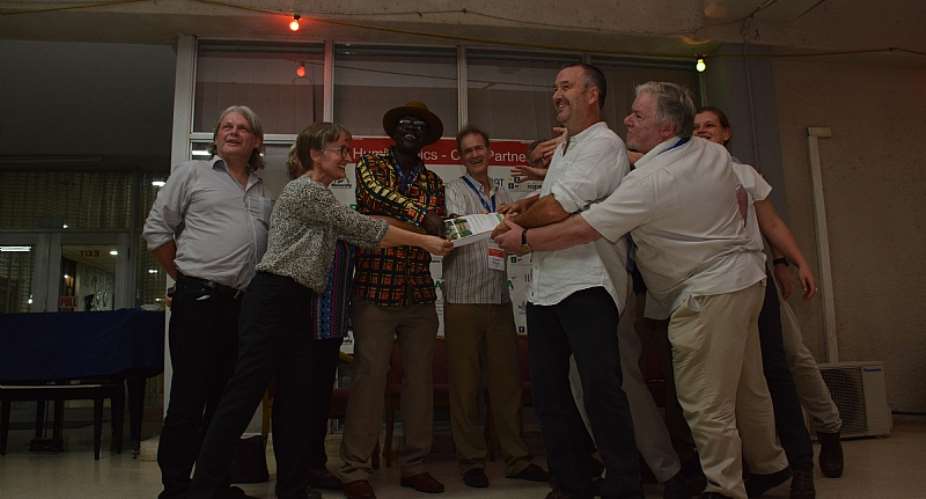Integrated systems research approach in agriculture is key to sustainable transformation in Africa with benefits including increase in yields and livelihoods improvement of resource-poor farmers, according to the Director General of the International Institute of Tropical Agriculture, Dr Nteranya Sanginga.
The systems approach places the farmer at the center and develops an understanding of the farm-household, the environment in which he/she operates, and the constraints he/she faces; together with identifying and testing potential solutions to those constraints. It also involves the dissemination of the most promising solutions to other farm households facing similar problems.
Dr Sanginga threw his support to systems researchduring his welcome address to participants at the “Systems Marketplace” workshop held 15-17 November at IITA Ibadan. The meeting was organized by the CGIAR Humidtropics program, in partnership with the Forum for Agricultural Research in Africa (FARA).
The IITA boss reiterated IITA’s strong history with and commitment to integrated systems research, adding that even though CGIAR would no longer fund standalone systems research programs in its new portfolio, IITA would continue to support systems research and site integration efforts to successfully help with Africa’s agricultural transformation agenda.
According to him, “the work of the Humidtropics program has been shown to be very important for improving livelihoods of smallholder farmers, which is attracting the interest of governments and some key donors.”
Dr Kwesi Atta-Krah, Director of the Integrated Systems on Humidtropics program said system thinking was the way to go. “If we want transformation in Africa, we must approach issues in the agricultural sector with systems thinking because the African farmer thinks systems—on his farm, he plants cassava, yam, vegetables and name it. It is not just a single crop that he plants,” he explained.
More than 100 participants including leaders and researchers at the CGIAR System, Center and Program levels, representing subject, organizational and cultural variety attended the 3-day Marketplace workshop. For three intensive and productive days they shared their knowledge and experiences to facilitate integration of systems thinking, tools, methods, approaches and partnerships in other Research for Development (R4D) initiatives.
Presenting an independent and general perspective on systems research in the new CGIAR Research Programs (CRPs) portfolio, Professor Maggie Gill, Chair of the ISPC (Independent Science and Partnership Council) CGIAR, mentioned that she was at the event to learn what systems research products were on offer, how new CRPs integrate systems approaches to enhance their contribution to achieving the development outcomes outlined in the CGIAR strategy and results framework.
Dr Peter Gardiner from the CGIAR System Organization said the systems work done by the Humidtropics collected tools that would be mainstreamed into the new programs.





 Chairman Kingsley Owusu Brobbey calls for Privatization of Electricity
Chairman Kingsley Owusu Brobbey calls for Privatization of Electricity
 Train accident: Four more grabbed and remanded
Train accident: Four more grabbed and remanded
 Gov't to consolidate cash waterfall revenue collection accounts
Gov't to consolidate cash waterfall revenue collection accounts
 Gov't to settle lump sum for retired teachers by April 27
Gov't to settle lump sum for retired teachers by April 27
 Former PPA CEO granted GH₵4million bail
Former PPA CEO granted GH₵4million bail
 Dumsor: The darkness has exposed you; you’ll go down as the worst in Ghana’s his...
Dumsor: The darkness has exposed you; you’ll go down as the worst in Ghana’s his...
 Dumsor: The ‘incompetent’ person provided a timetable whiles those who came to s...
Dumsor: The ‘incompetent’ person provided a timetable whiles those who came to s...
 Defend, ensure NPP’s good works are ‘sold’ and highlight the ‘bad’ state of the ...
Defend, ensure NPP’s good works are ‘sold’ and highlight the ‘bad’ state of the ...
 Bawumia will rank high ahead of Mahama in any anti-corruption test — Salam Musta...
Bawumia will rank high ahead of Mahama in any anti-corruption test — Salam Musta...
 NPP trying to bribe us but we‘ll not trade our integrity on the altar of corrupt...
NPP trying to bribe us but we‘ll not trade our integrity on the altar of corrupt...
